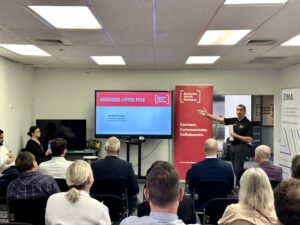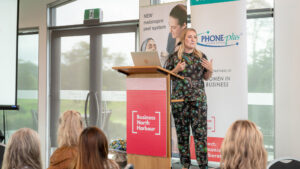Digital transformation is a top agenda item for many organisations; however, the advent of Covid-19 and the ensuing lockdowns has expedited this process at an unprecedented rate. Businesses large and small, from side hustles and start-ups to the well-established, are all making this a significant priority.
What is digital transformation?
Software company Salesforce defines it as: “The process of using digital technologies to create new — or modify existing — business processes, culture, and customer experiences to meet changing business and market requirements. This reimagining of business in the digital age is digital transformation.”
Digital transformation means different things to different businesses, for example, shifting a company to an online cloud-based system, migrating legacy systems, embedding a new ‘software as a service’ platform, or upgrading well-established systems to reflect changing market needs. For others, their transformation has been a proactive move to use a broader array of digital tools to improve automation, productivity, and efficiency.
‘Going digital’ for some has been by necessity rather than choice. However, it has numerous benefits, not in the least making business, data, information, events, and entertainment more accessible locally, regionally, and cross-border.
A recent example of digital by necessity:
The New Zealand Government has been hosting APEC 2021, a significant event that should have brought circa 20,000 delegates and media to our shores throughout the year. It is the culmination of several years of planning for an intense schedule of in-person meetings, events, and summits. Instead, the New Zealand event team had to convert to an entirely virtual event to deliver hundreds of meetings to thousands of people across 21 economies and 11 time zones (spanning a 17-hour difference!). This shift to a virtual event was an enormous undertaking.
With ‘digital’ such a hot topic, we were interested in speaking to some companies at different stages of the business lifecycle about digital transformation and digital tools.
Aime Ltd
Serial entrepreneur Echo Guo owns a handful of tech companies; we spoke to her as co-founder and CEO of Aimy Ltd, a software as a service (SaaS) provider. Their proprietary software, aimy Plus, is a vital tool in the transformation of many organisations.
It is a purpose-built, user-friendly, cloud-based booking engine that provides tailor-made before and after-school care programme management. For example, after-school care classes, holiday camps, sports clubs, ballet schools, tuition, and more; all tracked in real-time. Echo says that being a relatively young company, they have benefited from using all the latest tech to create a robust, agile, digitally based company. “We haven’t trans-formed as such, as we have been digital from day one; our foundation is digital, our ethos is digital.”
The team focuses on impactful transformation. Echo says, “The past four years have been a period of rapid growth; we have been the conduit for the digital transformation of over 700 (and counting) education franchises and providers across seven countries.”
From the testimonials, it is evident that their onboarding support in migrating their clients from paper-based, offline systems to a digitised solution has deliv-ered extensive cost reductions in time spent, accuracy, reporting, and overall administration.
In terms of digital tools, Echo mentions that she is amid a capital raise for her new start-up, MetaDojo. “Given the complexity of the subject matter and the fact we can’t all be in the same room, you can’t beat the efficacy of Zoom screen sharing for collaboratively preparing documents and presentations!”
Telegram is her go-to app for everyday team communication. “We migrated away from using WeChat as the increasing layers of verification made it less user-friendly. Telegram is fast, encrypted, and there are no limits on document or image size. Plus, a group can have up to 200,000 people, in contrast to WeChat’s limit of 500. I also use Discord, which works well for collab-orating with our developers.” She adds that she couldn’t live without Calendly, an online hub for scheduling meetings, eliminating the time and hassle of back-and-forth emails.
Echo recommends that a start-up’s roadmap should include a digitised model from the outset. “You have an opportunity to start as you mean to go on; it is more difficult to embed new systems or migrate legacy systems into a mature company than it is to start with something that can evolve as your company grows.”
The Drug Detection Agency
Market leader The Drug Detection Agency (TDDA) is the go-to solution provider for workplace drug and alcohol policy, education, testing, and Health Tick medical services. Founded in 2005, they have 65 locations throughout Australia and New Zealand, including nearly 100 specialist mobile testing vans and qualified collecting and screening staff.
With the sale of TDDA’s lab testing services (TDDA Omega Laboratories) to Hill Laboratories and their recently announced strategic partnership with Healthcare Hold-ings Ltd (HHL), HHL acquired 57.5% of TDDA; transformation has been on the agenda. We spoke to co-founder and CEO Kirk Hardy about their digital transformation.
TDDA has embarked on two distinct digital projects with future-proofing top of mind. The first focused on customer acquisition, data insights, and reach. Kirk shared, “we understand the power of data in marketing, so we moved to CRM platform Hubspot, which is a great way to pull your digital marketing assets into a single, more manageable system. It combines data from our web pages, Google Analytics, CRM, social platforms, and more, enabling us to reach out and market to new (and existing) clients.”
The second project is a custom-built, state-of-the-art data-collection portal, IMPERANS. Designed to streamline and increase the efficiency of TDDA’s business units, they have moved from time-consuming manual data entry, collection, and reporting to an automated, efficient digital system. “People are at the heart and soul of everything we do; our staff, clients, and their staff all interface with us. Any system we designed had to be fast, intuitive, user-friendly, trusted, and secure,” said Kirk.
He adds, “We are in the business of health. Fundamentally, we are a science-based company that collects medical data. We admin-ister drug, alcohol, Covid-19 tests, and Health Tick services. It requires the collection of ‘rich data’ – names, employment details, birthdates, and more. A custom-built solution was the only answer for us; privacy and security are paramount.”
Both transformation projects have added enormous efficiencies across the TDDA business units in terms of time-saving, and crucially, it has meant data and insights are available at the touch of a button. They also have a handy app designed as a practical workplace tool. It includes helpful drug information and checklists for people who have attended specialised drug awareness training with TDDA.
Snell Packaging & Safety
Snell is New Zealand’s largest private-ly-owned packaging company. They specialise in B2B industrial packaging, specialist pack-aging, food service, safety, hygiene, and PPE products.
We spoke to their CFO John Cash, who has been part of the leadership team since 2010 and has been instrumental in their large-scale digital transformation.
John shares that they began their transfor-mation project four years ago by undertaking a cloud readiness review. As a mature business (over 50 years in the packaging industry), they were aware that the process would require considerable work to upgrade infrastructure, systems, and operations, including buy-in at all levels of the business.
John notes that their transformation required extensive research and planning before even getting to the implementation phase, not in the least due to their size or volume of inventory (20,000+ products). They also had numerous legacy systems in place that (mostly) did not interface with each other. “We invested heavily in the preparation process because our focus was on truly future-proofing the business and supporting our growth.”
After significant research, and a consider-able amount of time scrutinising their business needs, Snell settled on the SaaS platform Microsoft Dynamics 365. “It combines the technologies of traditional enterprise resource planning (ERP) with customer relationship management (CRM) into a single system. It encompasses data visualisation tools, supply chain management, demand planning, warehousing, finance, operations, sales, and communication tools.”
Snell also engaged a specialist provider to build a new e-commerce platform that integrated directly with Microsoft Dynamics. The result, a nearly 30% increase in traffic to the site. “It has delivered all the efficiencies you would expect of a purpose-built platform, including vastly improved ordering processes, a simplified UX, clear conversion pathways, and open a payment gateway for non-account customers allowing for new B2C customers. It means we can function seamlessly in a fully digital world.”
John’s advice: “A large-scale digital trans-formation is a big investment. Ensure your project team understands and can clearly define your business infrastructure, workflow streams, and associated processes.” He also notes that a provider that has a thorough understanding of your needs will do a better job of making best-fit recommendations.
Platforms by the numbers. Did you know?
• Telegram has 500+ million* active users
• WeChat has 1.24 billion* monthly active users
• Calendly has 10+ million users
• Microsoft Teams has 250 million* monthly active users
• Discord has 350 million* registered users; 140+ million monthly active users
• Zoom has had 477+ million* downloads & > 350 million daily meeting participants
• Hubspot has 128,000+ customers in 120+ countries
*Stats source: The Business of Apps 2021 report
Whatever stage your business is at, digital transformation requires planning. The Government-backed Digital Boost Skills Training programme (free for all Kiwi small businesses) is an excellent place to start if you want to upskill as part of the process. There are hundreds of short educational videos with instantly actionable insights, plus live Q&A and Fireside Chat sessions with industry experts & business owners.
BusinesscashflowDigital




